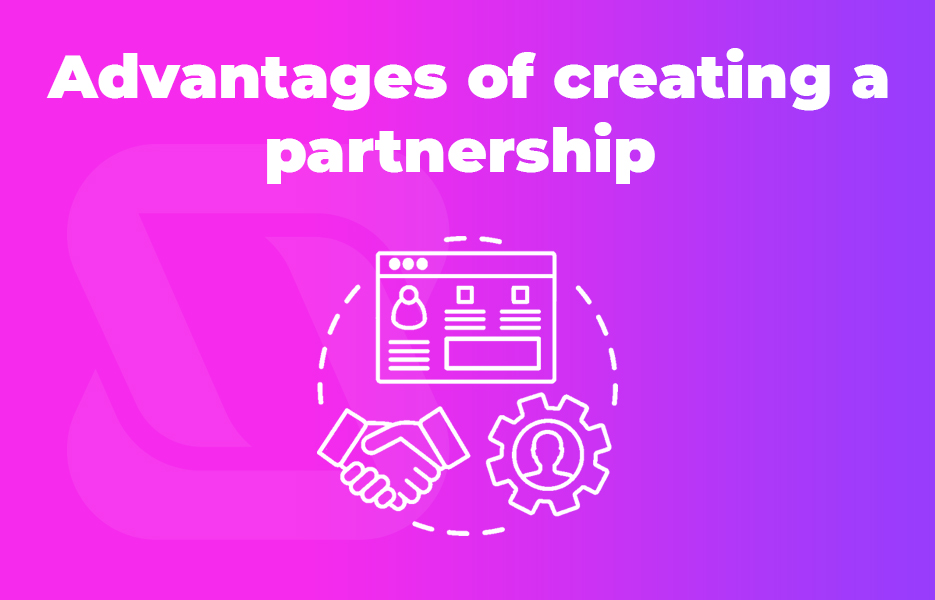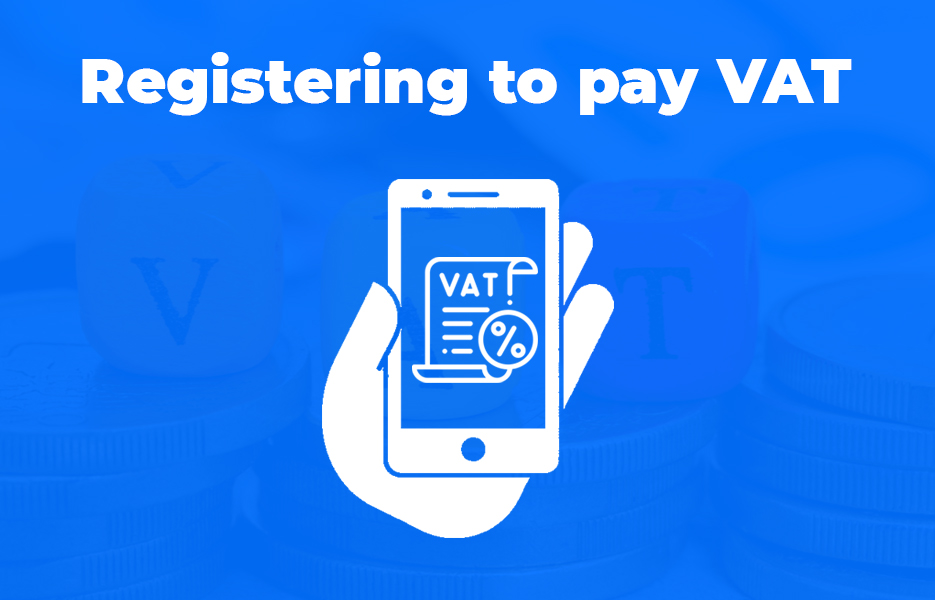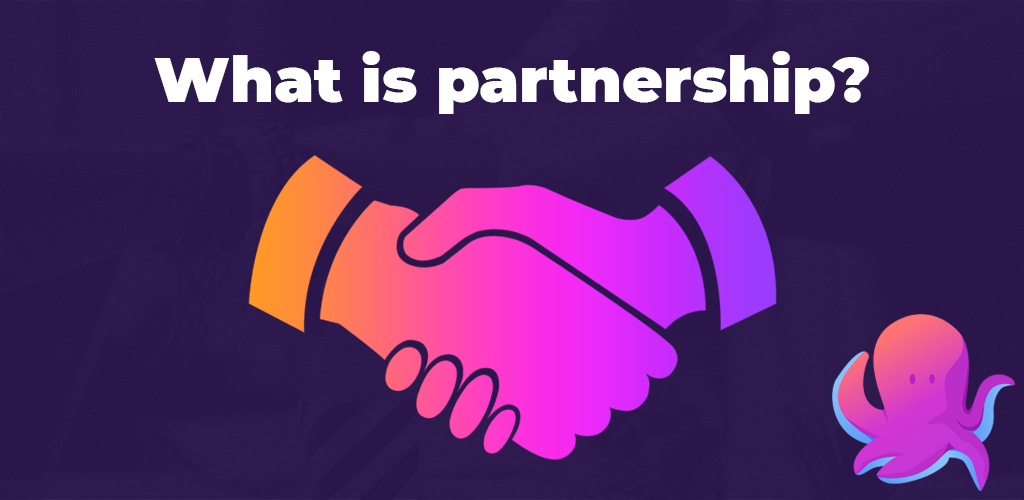What is partnership?
When you’re setting up a business in the UK, there are a number of different ways you might set up the company, depending on the aims of the business and how many people are involved, as well as how profits are to be shared – along with tax considerations.
We’re looking at business partnerships in the UK in this post, because that’s where we’re based – so if you’re looking at creating a partnership in other countries worldwide, you’ll need to look at the implications for your business there. As always, we strongly recommend consulting with an accountant or tax professional in the country that you will be operating, so that you’re fully informed.
What is a partnership?

A partnership is a type of business arrangement where two or more people, or companies share ownership of the business. The partners also share responsibilities for managing the company, the income, and any losses that the business encounters.
Advantages of creating a partnership

Why is it a good idea to create a partnership for your business? Well, there are a few reasons that may mean a partnership arrangement is the right thing – let’s take a look.
Less formal, with fewer obligations
This means it is simpler to maintain the accounting process, and you won’t need to complete a confirmation statement, or anything else from Companies House. And unless you’ve drawn up a formal partnership agreement, a partnership business can be easily broken up at any point.
Simple to set up and get started
As we just said, there’s no need to register anything with Companies House, and the process for registering with HMRC is relatively straightforward. You don’t even need to set up a partnership agreement if you don’t want to – although it is a wise move to do so, to protect all parties concerned.
Shared load
Rather than working as a sole trader, in your partnership you can share the workload, as well as benefiting from support when times get tough. If this is your first time in business, knowing you’re not alone is likely to be a comfort.
Shared knowledge, skills and contacts
Since the partners will bring different skill sets to the business, it is likely to be more successful. Partners can cover tasks between themselves, so they can take care of the tasks that they excel at, or they can cross-train one another to help eliminate single points of failure in the business.
Shared decision making
Sole traders often have to make difficult decisions by themselves. Partnerships mean that there is always someone to share those tricky decisions, offering different perspectives and (hopefully) leading to a better conclusion.
Privacy
Where businesses choose to become limited companies, there are some details that are made available for the public to access through Companies House. With a partnership, details can be kept confidential, because there are no requirements to make anything public.
Ownership and control are joined
In a partnership, the partners own and control the business. There are no shareholders to answer to, meaning that partnerships may be more flexible than a limited company.
Adding additional partners means increased potential capital
Where there are more partners in the business, there are more likely to be finances they bring to the business. Additionally, there are likely to be greater borrowing opportunities with more partners.
Adding additional partners is easy to do
Unless there has been a formal partnership agreement drawn up that precludes it, it is usually relatively easy to add another partner to the business. This may mean that hard working staff with the right skills may be rewarded by being made a partner.
Profits are easily divided
In a partnership, profits are split simply between the partners. Tax is paid through their personal tax returns, rather than needing to be paid as a salary with PAYE (Pay As You Earn) or in the form of dividends.
Challenges of creating a partnership

Although partnerships can be the right solution for some, there are some serious downsides to creating a partnership rather than a limited company. Here are some of the downsides to creating a partnership.
No independent legal status
With a partnership, the business has no independent legal existence that is separate from the partners. That means that unless there is an agreement in place, if one of the partners resigns, no longer wishes to be associated with the business or in the worst case, they die, the business will need to be dissolved. This means the business may feel insecure or unstable, and the remaining partners may not be in a position to purchase the departing partner’s share.
Unlimited liability
In a partnership, the partners are exposed to greater risk since they are jointly liable for the operation of the business. If debts are incurred, the partners are obligated to cover those debts – and so possessions may need to be sold in order to make that happen.
Partnerships are perceived to be lower status, or less prestigious
Limited companies are often thought to hold a more valuable status than partnerships – since partnerships appear temporary, and that financial information can’t be checked through Companies House, some individuals and businesses will choose not to work with partnerships.
Harder to access capital than with a limited company
Although a number of partners may be able to contribute more capital, partnerships may still find it difficult to borrow money. The apparent lack of permanence, and lack of transparency can lead to banks and investors being less inclined to lend to partnerships, or may only do so with less generous terms.
Potential conflicts and differences
As a partnership, where decisions need to be made, conflict may arise. These may develop over time, and unfortunately, they may lead to the partnership coming to a close. Partnership agreements can prevent such issues occurring, and can include procedures that should be followed when disputes occur.
Decision making may be more difficult and slower
Although decisions may be more informed with more than one partner, there is also the chance that decisions may be more difficult where opposing views are held. Negotiations may need to take place, and could lead to opportunities being missed – which could lead to frustration with partners who have been sole traders in the past.
Profits are shared
The Partnerships Act states that profits should be shared equally. But things aren’t always that straightforward, especially where there is different levels of work being put into the company. Partnership agreements can offset that, but these should be implemented sooner rather than later.
Working with a partner may be demanding
When there is more than one person trying to work together, sometimes it can get demanding – especially where not everyone shares the same opinion about how much work should be put into the company. This may lead to a lot of time and energy being spent on negotiations, and being distracted from the business.
Tax arrangements may not be suitable
This is the reason we recommend always speaking with an accountant or tax professional before making any decisions – limited companies may offer better tax planning opportunities than business partnerships. Different individual circumstances will need to be taken into account though, so getting professional advice is always a good idea before proceeding.
Business development may be limited
Where businesses are looking to achieve huge growth in their company, a partnership is likely to be the wrong decision. A lack of funding opportunities, unlimited liabilities and the lack of legal personality may mean that choosing a different company structure would be better.
Setting up a business partnership in the UK

In a partnership in the UK, each of the partners share personal liability for the business. That means if the business makes a loss, or needs to buy stock or equipment, each is responsible for that.
Each partner receives a share of the business’s profits, and pays tax separately on their earnings. It is important to note that a partner can be a limited company, which can count as a ‘legal person’ – the partner doesn’t have to be an individual person.
Setting up your partnership in the UK is relatively straightforward – but before you proceed to create a partnership, it’s a wise idea to consult with an accountant or tax professional, to ensure it is the right solution for your business. Note that there are different rules for setting up limited partnerships and limited liability partnerships, so it is important to ensure you are creating the right type of partnership for the needs of your business.
You can also appoint your accountant or tax professional (an ‘agent’) to deal with HMRC on your behalf – which can take a lot of the stress out of your tax requirements!
If you’re sure it is the right step, then here are the things you’re going to need to do to get your partnership established.
Pick a name
There is absolutely nothing to stop you trading under your own names, or you can pick another, so that your business has a name. If you’re going to use your name, you don’t need to register it. However, you have to include all the partners’ names, and the business name (assuming you’re going to use one – if you’re not, then don’t include one) on all your official paperwork.
- Your business partnership name should be unique – it is not allowed to be the same as an existing trade mark, so you should ensure you have checked this before you make any changes.
- Your business partnership name is not allowed to include ‘limited’, ‘Ltd’, ‘limited liability partnership, ‘LLP’, ‘public limited company’ or ‘plc’.
- Your business partnership name is also not allowed to be offensive, and shouldn’t contain a sensitive word or expression. You’re also not allowed to infer a connection with the government or local authorities – such as using the word ‘Accredited’ in your name – unless you have gained permission to do so. You can find more information about the requirements for naming a company here.
- You will also need to register your name as a trade mark if you want to ensure nobody else can trade under your business name.
Choose who will be the ‘nominated partner’
This is the person that will be responsible for managing tax returns and other records for the business.
Register the partnership with Her Majesty’s Revenue and Customs (HMRC)
The nominated partner should register the partnership for Self Assessment with HMRC, and that partner is responsible for sending the tax return for the partnership as a whole. The other partners will need to register for tax returns separately, and each partner will need to send their tax returns each year as individuals.
If you are unable to register online for any reason, you can register the partnership using the form SA400, and you can register as a partner using form SA401.
Registering to pay VAT

If the VAT taxable turnover for the partnership is over £85,000, you must register for VAT. Businesses earning less than this amount are able to register if they wish, if they want to be able to reclaim VAT on supplies and so on. Check with your accountant before you go ahead.
Setting up a business needs to be well thought-out to avoid costly mistakes occurring. Partnerships may be an ideal solution for some companies, particularly those that are likely to be a short-term project. Be sure you know the pros and the cons, especially where risk may be high or investment required. And we’ve already said it in this post, but we strongly suggest consulting an expert before making a decision – your accountant or your tax professional.








DropShip products from verified suppliers to diversify your inventory and scale your eCommerce business